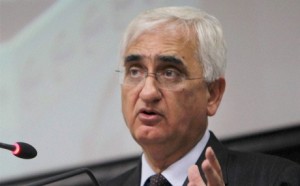 A stable�Afghanistan�and�Iran�are critical to India's�energy security, as these two countries can provide greater access to Central Asian region, which has abundance of hydrocarbon wealth, External Affairs Minister�Salman Khurshid�said on Saturday.
A stable�Afghanistan�and�Iran�are critical to India's�energy security, as these two countries can provide greater access to Central Asian region, which has abundance of hydrocarbon wealth, External Affairs Minister�Salman Khurshid�said on Saturday."We are looking at re-energising the national North-South Corridor to connect India with Central Asia and Russia through Iran and also looking at trans-Afghan routes using Iranian port of Chahabar particularly to get access to Afghanistan, Uzbekistan and Tajikistan. We are looking at a rail link from Kazakhstan to Turkmenistan into Iran," Khurshid said.
"Of course, it does make Iran very critical. On the other hand, it makes Afghanistan very critical. Therefore, we hope that within our philosophical approach of being friends, we get Afghanistan back to a stable situation. Afghanistan will then become a bridge for us to Central Asia and Iran as well," Khurshid said while addressing a three-day conference on Central Asia at the Kashmir University here.
The minister also expressed hope that Iran will be able to resolve its nuclear energy issues with the European Union. "(When) Iran will be able to find a resolution with the European Union + 1 on the issue of nuclear energy so that Iran also becomes an important link between us and Central Asia. It will give us far greater access to Central Asia than we have now," he said. Khurshid said India has been closely watching the development related to the peace process in Afghanistan.
"We have been watching with care and close scrutiny the developments in Doha (Qatar) about the possibility of a conversation and dialogue between the 'willing' Taliban and High Peace Council of Afghanistan."
"We feel and we have said this to our friends, in the US and the European Union, that our collective decision which is very very strongly endorsed in Afghanistan that the peace talks must be Afghan led and Afghan controlled," he said.
The minister said it was not possible for anybody from outside to conjure a successful peace architecture for Afghanistan or any other part of the world.
"I believe that the peace must come from within. Despite repeated invitations, India believes it must restrain itself to a point which is consistent with our philosophy and allow the Afghan people to choose their own destiny," he said.
Khurshid said India will help in reconstruction and development of Afghanistan and expects the government in that country to deliver on issues like drug trafficking, religious extremism and fundamentalism.
"We will help them (Afghans) in completing the parliament building, which will be ready in three months. We will help them build the dams, we will help them build the roads but they must populate the Parliament with the voices of Afghan people. We shouldn't impose any preconceived notions of democracy. We can share our experiences but at the end it has to be their own decision," he said. "We also expect them to deliver on drug trafficking issues and fundamentalism and religious extremism. It is very important that we really understand religious extremism and fundamentalism are not something that hurts only one society. It is a fundamental challenge to our human values and aspiration for peace," he added. Khurshid said if India has to grow at 8 to 10 per cent, it needs to look at alternative sources of energy which are clean as well as allow greater self-reliance. He said increasing the number of nuclear power plants can be one of the options but "whether we will be able to increase that is something that is still in the air. People have different view on nuclear power plants." "Till we are able to move on to an alternative solution to our energy problems, we cannot wait for energy to be made available. Therefore, energy cooperation with Central Asian countries like Kazakhstan and Uzbekistan which are rich in hydrocarbon sources is extremely important," he said.
Khurshid said although the carbon emissions in India are a fraction of those of the developed world like the US and the European Union, but it will grow "if we continue to rely on conventional forms of energy and we continue to aspire to grow at eight per cent or 10 per cent." He said the government is working on several things, including a liberalised visa regime with Central Asian countries, to enable "more convenient and liberal access to people on both sides to travel". On the development partnership with Central Asian countries, Khurshid said India has "done reasonably well in food processing, data processing, renovation and upgradation of hydroelectric power plants, computerisation of post offices and IT centres of excellence in Tajikistan, Turkmenistan, Kyrgyzstan, Uzbekistan and Kazakhstan." He said India is looking at setting up of Central Asian Universities in near future.
By Business Standard
The Iran Project is not responsible for the content of quoted articles.










